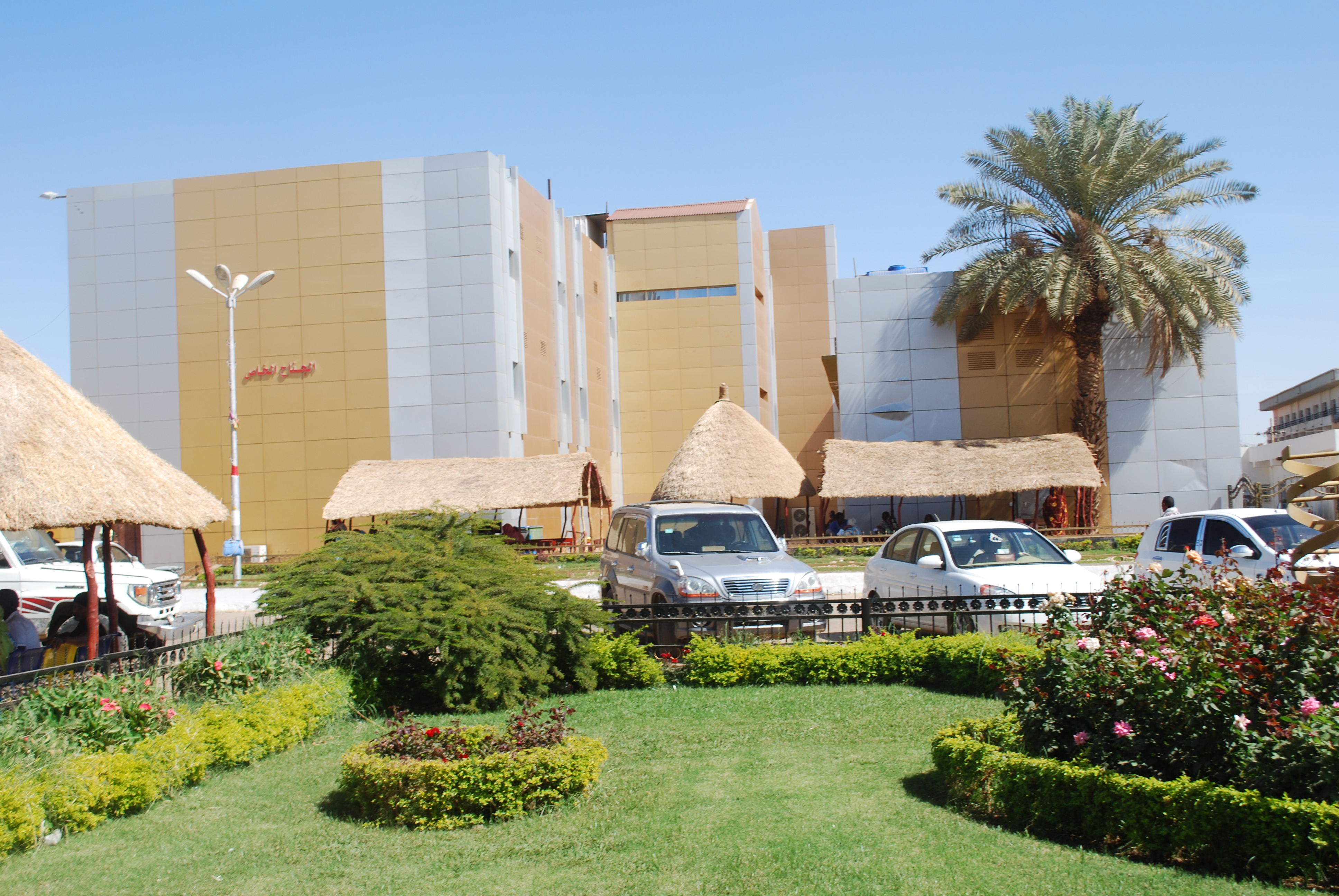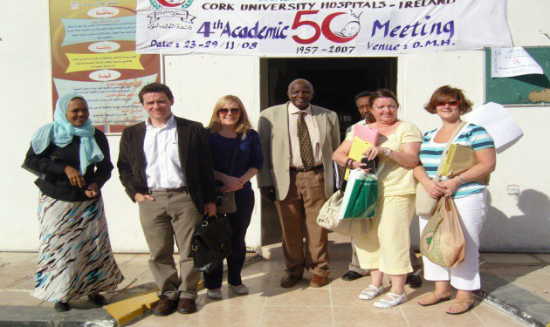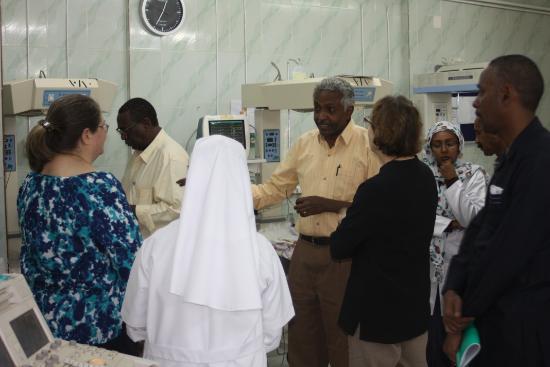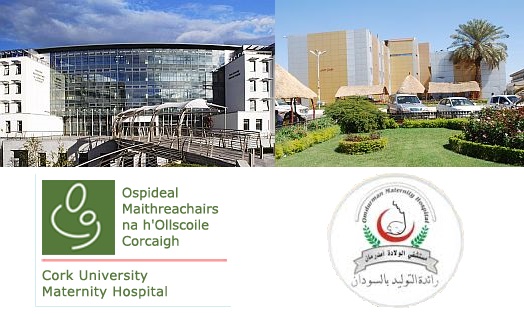Partnership
CUMH-OMH Partnership

Overview
The Cork University Maternity Hospital (CUMH) - Omdurman Maternity Hospital (OMH) Partnership originated in 2002 and has grown in strength over the last numbers of years.
The ultimate aim of the partnership is to improve obstetric and paediatric services, and fistula services, in Khartoum, and to advance teaching / training programmes related to Omdurman Maternity Hospital and the Fistula Unit. This includes specific goals such as:
- Goal 1: Develop a healthcare partnership model in maternity care which can be replicated elsewhere.
- Goal 2: Develop a bilateral education and research programme to identify pertinent factors relating to infant and maternal mortality and assess different intervention strategies.
- Goal 3: Implement evidence based and efficient obstetrics and gynaecology, neonatal and midwifery clinical practice to reduce maternal and perinatal mortality.
- Goal 4: Develop existing fistula services and a new urogynaecology centre.
- Goal 5: Significantly improve the Omdurman Maternity Hospital facilities and hygiene (e.g. buildings, waste management, infection control, computers, IT etc.)
- Goal 6: Develop a hospital management structure appropriate to a maternity hospital in Sudan.
- Goal 7: To introduce and implement the Helping Babies Breathe Programme into the states and villages throughout Sudan.

History
The Cork University Maternity Hospital (CUMH) - Omdurman Maternity Hospital (OMH) Partnership originated in 2002, when a paediatrician, Dr Sami Ahmed, neonatologist Prof Anthony Ryan, and a neonatal nurse Dr Lisa Clarke, all from Cork, Ireland, taught the Neonatal Resuscitation Programme in Khartoum to 90 providers and 28 instructors, including midwives and doctors.
It was then suggested that CUMH should make some contribution to the developing world, focusing particularly on hospitals / services with which CUMH could partner. A working group was established in CUMH and staff was offered the opportunity to submit projects for consideration. Following extensive discussion and consideration Omdurman Maternity Hospital, Khartoum and the Fistula Unit in Khartoum, Sudan, were chosen as the partners for this project.
As a first step in the partnership programme, a subgroup of eight from the Unified Maternity & Neonatal Services in Cork, consisting of medical, midwifery and other staff, was set up. Members included:
o Prof. Tony Ryan
o Prof. John Higgins
o Dr. Murshid Ismail
o Dr. Barry O’Reilly
o Ms. Noreen O’Sullivan
o Ms. Agnes Phelan
o Ms. Eileen McCarthy
o Dr. Sami Ahmed
The subgroup travelled to the Omdurman Maternity Hospital and Fistula Unit, Khartoum, in January 2005. There they met with staff and patients and discussed what could be achieved via the partnership. Upon return, the subgroup reported back to CUMH and began the process of developing this partnership plan. The key people they met in Khartoum were:
· Dr. Al Zain & his team at Omdurman Hospital
· Dr. Esam Gaffer & his team at the Fistula Unit
Upon return, the subgroup reported back to CUMH and began the process of developing this partnership plan. The development of this plan involved a number of workshops and teleconference calls with senior staff in Omdurman Maternity Hospital, the Fistula Unit and the Unified Maternity & Neonatal Services in Cork, over the period of July to December 2005. The development of this partnership plan was facilitated by Prospectus Consultants, on a pro bono basis. In March 2006, a team of nine doctors, nurses, and senior administrative staff from Omdurman Maternity Hospital made their first visit to Cork. The partnership plan was signed off by the Cork subgroup and the Omdurman Maternity Hospital team during this visit and has grown in strength since then.

Background
Omdurman Maternity Hospital
Omdurman Maternity Hospital was established in 1957 with a total of 499 deliveries and since then has continued to provide obstetric and paediatric care to an increasing population, (currently 6 million in the greater Khartoum area). In 2003, deliveries at the hospital totalled
17,288. Facilities in the hospital (in February 2006) include:
- 150 beds (additional beds will be required when gynaecological services are transferred)
- 2 labour wards (with 7 delivery tables and 16 first stage beds)
- 4 theatres (including 6 operating tables)
Staffing in the hospital includes 2 consultant obstetricians/gynaecologists, 4 consultant paediatricians, 2 consultant anaesthetists, 9 anaesthesia assistants, 20-25 obstetric registrars, 2-4 paediatric registrars, 50-60 obstetric house officers, 14-16 paediatric senior house officers/medical officers, 50 qualified midwives, 40 sisters in training, 20-24 neonatal nurses.
Prof. Abbo Fistula Unit, at Khartoum teaching hospital, was established in 1990. It is the only specialised centre in Sudan that provides free care and surgical repair for all types of fistula and urine stress operations. In 2005, the centre was renewed and new extensions were added, to increase the capacity of work. Currently approximately 12-20 new cases per week attend the outpatient and examination facilities. Only about 6 patients are operated on per week, that is 250 to 300 operations per year. The Fistula Unit plans to double this number in 2006, when a new theatre and new extension will be opened. It is hoped that this will help to shorten waiting lists. The Fistula Unit’s success in fistula repair is about 95% for small fistulae and 80% for other type of fistula.
Capacity of the Fistula Unit:
- One theatre room (the new theatre has three tables)
- 26 beds -13 beds preoperative & 13 beds postoperative - 16 beds in the new ward
- Out put and examination room
- Reception and dressing room

Financial Accounts
Project Finances
The financial accounts for the Cork University Maternity Hospital (CUMH) Omdurman Materity Hospital (OMH) partnership are available online here:
CUMH OMH Income/Expenditure for Year Ending Nov 2012
CUMH OMH Balancing Statement 2012
Policy and Procedures
Policy and Procedures
Financial policies and procedures
The CUMH-OMH Partnership follows all of UCC’s financial policies and procedures e.g. Agresso Purchasing Policy, Departmental Credit Cards Policy and Procedure, VAT Procedure and UCC Travel Policy to name but a few. These can all be accessed online here: http://www.ucc.ie/en/policiesandprocedures/financeoffice/
Fraud policy
The CUMH OMH Partnership abides by the anti-fraud policies of University College Cork (UCC) which are outlined by the Office of Corporate and Legal Affairs in UCC’s Risk Management Guidelines. This includes an audit process which independently monitors the controls and procedures across the University including all research groups and projects established under the Cork University Foundation. This helps to ensure system reliability, minimise risk and act upon suspicion of fraud or corruption in the event that it arises. http://ocla.ucc.ie/RiskMgt/UCCRMpolicy&process_FINAL_approvedGB_120213.pdf
While UCC is currently developing specific anti-fraud policies the CUMH OMH have adopted best practice anti-fraud guidelines as set out by Charity Finance Group in the United Kingdom. Their Charity Fraud Guidelines recommend a series of actions including instilling a culture of ethical behaviour, assessing risks, implementing financial controls, and developing an anti-fraud and whistleblowing policy which we are currently implementing.
http://www.cfg.org.uk/resources/Publications/~/media/Files/Resources/CFDG%20Publications/charity_fraud_guide_full.ashx[B1]
Reserves policy
Procurement policy
The CUMH OMH Partnership follows University College Cork’s Procurement Policies which can be found here: http://www.ucc.ie/en/procurement/procurementpliciesandprocedures// We liaise with the Procurement Office at UCC to obtain advice and support when purchasing equipment, goods or services. Where possible we use UCC approved suppliers or else we follow the research procurement guidelines: http://www.ucc.ie/en/procurement/researchprocurement/
Codes of conduct
Child protection policy
